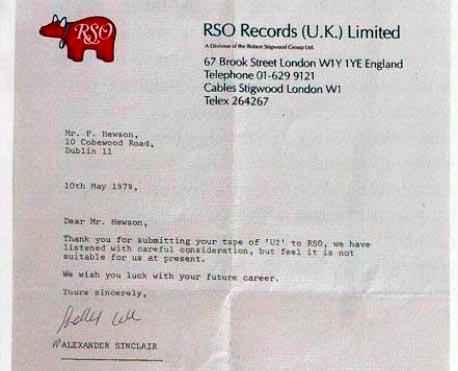Giving up when you’re rejected is easy. I’ve done it before. You probably have, too. The four members of U2 didn’t give up when they rejected, though. They’re wealthy, famous and successful today. But they wouldn’t be if they had given up in 1979 when a major record label rejected them.
U2 formed in Dublin, Ireland, in 1976 as a band called Feedback. After a couple of name changes, they ended up as a four-man band called U2 by 1978. They were able to release some music just for the Irish market, but nobody seemed interested in taking them seriously.
One of the best-known music labels of the era was RSO Records. We found out this week that U2 submitted a tape to RSO — and on May 10, 1979, the label gave the band a polite brush-off.
“Thank you for submitting your tape of ‘U2’ to RSO, we have listened with careful consideration, but feel it is not suitable for us at present,” said the letter that was addressed to Paul Hewson, who you might know better as Bono. “We wish you luck with your future career.”
I can imagine Bono finding the envelope from RSO in the mail. I can imagine him opening the envelope and pulling the letter out. I can imagine his disappointment at being rejected.
So what do you do when you’re rejected? Do you talk yourself into being “realistic” and accepting that it’s time to move on? Or do you have a kind of hope and faith that’s willing to ignore the empirical evidence of rejection?
Hope is a double-edged sword. Hope stops you from giving up when you need to be determined and driven, but it can also lead you to keep fighting a lost battle when you need to back off and find a new battle to fight.
For those of us who have faith in things we hope for, it presents a dilemma. Do we continue to have faith and hope in spite of the stress it causes to believe in things we can’t yet see? Or do we give up and believe nothing except what we can see and prove?
Hope and faith are great things for some of us, but they deny us the relief of giving up when it would be easier to give up. Pragmatically, I’d prefer to just believe in what I can see, but something in me knows better than that in some cases.
I tend to believe and to hope — with all the baggage that can come with those things.
The members of U2 didn’t give up. They kept trying to get a record deal. They believed in themselves and they continued to hope that they were right in thinking they had the talent to succeed.
 Less than a year later, Island Records signed them. A couple of months after that, their first international single was released, followed by their first full album late in 1980. After 12 studio albums, U2 has been one of the most successful rock acts ever, having sold more than 150 million albums around the world.
Less than a year later, Island Records signed them. A couple of months after that, their first international single was released, followed by their first full album late in 1980. After 12 studio albums, U2 has been one of the most successful rock acts ever, having sold more than 150 million albums around the world.
None of that would have happened if the members of the group had accepted the rejection from RSO.
If you’re rejected, maybe it’s time to give up, but maybe it’s not. Unfortunately, you can’t really know until afterward whether you should have given up or kept pushing ahead. I’ve given up when I shouldn’t have. I don’t know that there’s ever been a time when I’ve regretted persevering. You just have to trust your own judgment and instincts about whether the time has come to walk away.
And what about RSO Records? That important major record label that didn’t see the creative or commercial value in U2 went out of business in 1983, just four years after rejecting the band.

 Step in the right direction: U.S. ad group bans cosmetic photoshopping
Step in the right direction: U.S. ad group bans cosmetic photoshopping Marriage is a business decision, not just matter of romantic love
Marriage is a business decision, not just matter of romantic love Predictions of doom keep failing, so isn’t it rational to doubt them?
Predictions of doom keep failing, so isn’t it rational to doubt them?